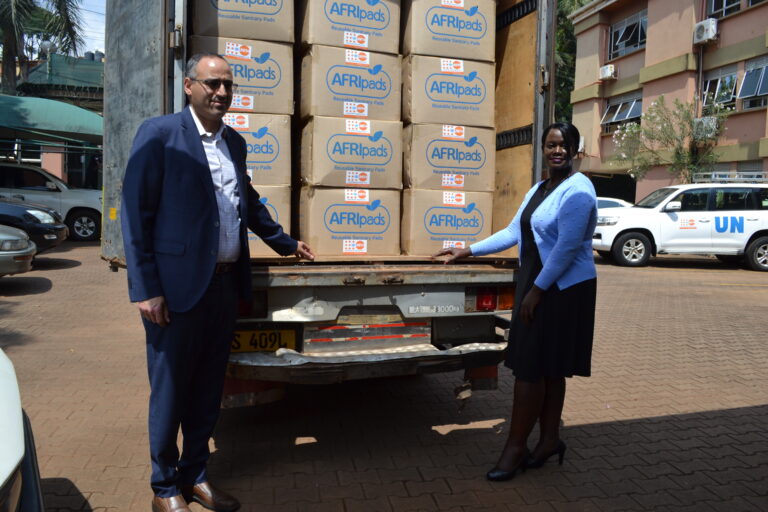The United Nations Population Fund (UNFPA) Uganda has handed over a consignment of menstrual health management commodities (re-usable sanitary towels) to girls and mothers in refugee hosting districts.
The consignment of 39,215 reusable sanitary pads worth USD200,000 (720 million shillings) was handed over by the UNFPA Uganda Deputy Representative, Daniel Alemu to the United Nations High Commission for Refugees (UNHCR) representative in Uganda at the UNFPA offices in Kampala on Friday.
The consignment is expected to fill the gap in provision of menstrual health hygiene commodities in the refugee hosting districts.
“UNFPA considers the needs of menstruating women and girls as a fundamental right issue and is committed to create a world where no woman or girl is prevented from accomplishing her potential due to her menstrual period. It is therefore our hope that this contribution. With a refugee population of 1.5 million people, living in 14 refugee hosting locations including Kampala, this contribution is timely,” Alemu said.
In 2022, UNFPA conducted a Rapid Needs Assessment in 10 refugee-hosting districts covering 10 settlements to determine the most urgent hygiene needs for young adolescent girls and women of reproductive age in humanitarian settings. The results revealed that the need for menstrual hygiene items ranked highly in position numbers 2 and 3.
To a greater extent, the Rapid Needs Assessment suggested the need to focus on resilience building for Persons of Concern (POC), to enable them meet their other needs including access to sanitary towels. In that assessment, respondents included other items such as soap and underwear, which underscores the need for income for persons of concerns in order to expand their choices and therefore their rights.
“Displacement because of conflict or climate disaster, further robs women and girls their dignity when they have difficulty managing their periods and this exacerbates their vulnerability. In Uganda, lack of access to sanitary pads has been recognised as one of the drivers of school absenteeism and consequent dropout, exposing girls to teenage pregnancy and early marriage. Women and girls may be excluded from daily activities because of stigma, shame or discrimination or because they are considered unclean,” Alemu said.
He added: “We are aware that adolescent health indicators in Uganda have stalled for the last two decades with teenage pregnancies remaining as high as between 24 – 25%, and HIV prevalence among women remains higher at 7.2% compared to 4.3% among men (UPHIA 2020 – 2021). Ensuring teenage girls have access to menstrual hygiene products therefore plays an important role in preventing SGBV and HIV infection as oftentimes girls are victimized by men who offer to provide or fund these necessities.”
Menstruation with dignity, Alemu said is a human right, adding that UNFPA believes its contribution will enable women and girls to enjoy their right to a dignified life and to participate in economic, education and other social activities.

